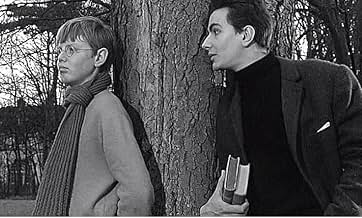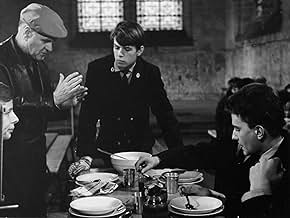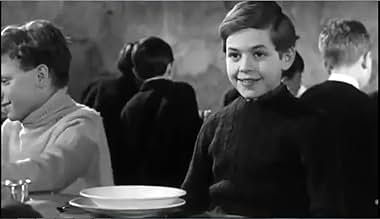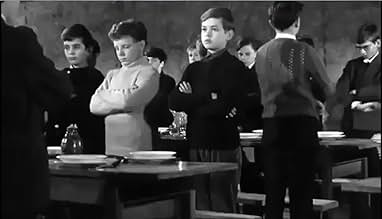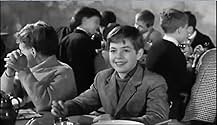IMDb RATING
7.7/10
3.3K
YOUR RATING
A tale of the tender relationship between a 12-year-old boy and the upperclassman who is the object of his desire in the rigid atmosphere of their Jesuit-run school.A tale of the tender relationship between a 12-year-old boy and the upperclassman who is the object of his desire in the rigid atmosphere of their Jesuit-run school.A tale of the tender relationship between a 12-year-old boy and the upperclassman who is the object of his desire in the rigid atmosphere of their Jesuit-run school.
- Director
- Writers
- Stars
- Awards
- 1 nomination total
Gérard Chambre
- André Ferron
- (uncredited)
Henri Coutet
- L'employé de l'institution
- (uncredited)
Dominique Diamant
- Maurice Motier
- (uncredited)
Alain-Philippe Malagnac
- Un élève
- (uncredited)
Bernard Musson
- Le père enseignant
- (uncredited)
Colette Régis
- La religieuse
- (uncredited)
- Director
- Writers
- All cast & crew
- Production, box office & more at IMDbPro
7.73.2K
1
2
3
4
5
6
7
8
9
10
Featured reviews
A Very Special Friendship
This Special Friendship was created in 1964 combining all the elements of a masterpiece. Born in the mind of Roger Peyrefitte, superbly adapted to the screen by Jean Delannoy, and exquisitely acted out by Francis LaCombrade and Didier Haudepin, this movie has become a timeless work of art. Set in France, in a religious Jesuit school, two boys, one sixteen, one twelve, intrigued by each other's company embark on a special friendship. This particular friendship which possesses all the unique qualities of genuine love and empathy is viewed as unholy by their priests who set about to destroy such a concept. The film is fashioned in black and white as were the rules of friendship in 1964. A classic, if ever there was one. Be prepared for some heart wrenching pathos. *****
Moving
I had read the novel (in English translation, one of two which have been published?) several years before seeing the film. It is, I think, characteristically French: carefully descriptive, observant, objective, restrained, but also subtly hypnotic. I read and read, and almost put the book down halfway through because it didn't seem to be going anywhere or making any impact on me. Then, all of a sudden, I was in tears-- but I still couldn't say exactly what had hit me other than everything. It was as though the pieces of a puzzle suddenly fell into place.
The film is faithful to the spirit as well as the letter of the book. Both were remarkably bold gestures for their time, describing an earlier generation and environment which were even more strait-laced. Like me, you may fall gently under its spell, then-- wham! Sheer magic.
The film is faithful to the spirit as well as the letter of the book. Both were remarkably bold gestures for their time, describing an earlier generation and environment which were even more strait-laced. Like me, you may fall gently under its spell, then-- wham! Sheer magic.
10hadock4
A pair of of star-crossed lovers
People who have loved the novel by Roger Peyrefitte should equally love the film by Delannoy. This story of a thwarted love between two young boys in a french Catholic college in the 50's, faithfully transcribes the nearly oppressive atmosphere which prevailed in religious boarding schools in those days. The climate of repressed, contained passion at times culminates in sublimated eroticism as when Georges kisses the medal worn by Alexandre against his breast. The film perfectly renders the perversity of some priests who secretly encourage the forbidden love, sharing it by proxy, while openly condemning it. A remake of this film could not possibly be made nowadays. It tells a story of a time when,as the great Burke wrote, though at a far anterior period, "vice itself lost half its evil by losing all its grossness". The cast is excellent and the Black & White pictures superb.
A Magnificent Work
French cinema has always been, if not the most profound and analytic in the world, indeed, the one that sets the benchmark. In this beautifully shot film, Delanoy tackles a difficult subject matter (for our days) that wasn't so then. When I saw Les Amities Particulieres for the first time, I simply couldn't realise how important it was. Now, after many years, I find it much more interesting than it would have been in the sixties. Many others have already written about the story. I will delve into a different approach: today's reality, at the beginning of the 21st Century.
The strength of our mediated world has increased exponentially and it will keep on growing. The way we look at our world today is consistently chiseled by the way information is provided, dissected, manipulated and delivered. We just consume it. With it, the apocalyptic view on pedophilia that, by the way, means affinity, love, for boys has been transformed completely.
Maybe we're more than insane today than in the 40's or the 70's, but by then people were not scared at all by this kind of love, even when it was clearly seen as sin if sexuality was involved. For us, pedophile means stalker, assassin, assailant, or, as the media loves to call them: molester.
It's a good idea to watch this film with an open mind. What happens has happened for centuries and will happen ever after, until the human race disappears. May this words imply that I defend pedophiles? Yes. I can't defend a criminal, but I can defend someone who loves another human being and is loved in response. Georges loves Alexandre and Alexandre is absolutely in love with him, despite the age gap (at that age, the gap is even more pronounced). Alexandre makes Georges swear his love for ever, his "special friendship", and writes him touching letters that only lovers can write. They simply can't help not loving each other, despite of the many obstacles in their way.
In today's perspective, Georges is a pedophile, a stalker, a child molester who would never, ever molest a child... a stalker that is stalked by his prey because... he loves him. This bond grows so strong that is shared with close friends that encourage this relationship.
What would the media say about something like this TODAY???? We all know the answer.
This film can teach, too, a lot in cinematographic techniques. The use of the camera is unusual for its time. Maybe one of the most daring movements is when Georges arrives in one of the first scenes of the film. The unique way of depicting the corridors in the cloister is another "first", when the steadycam wasn't even in a dream.
And, story-wise, we have to credit this film with one of the most powerful endings in cinema: after the "Fin" frames we discover the very last testament of Georges unread letter to Alexandre, which ends with the word "amour". All in all, a must-see.
If you want to consider further what I said before (I know it will be hard for many people to swallow) I recommend watching "Wild Tigers I Have Known", a 2006 film made by Cam Archer, 26. It draws a similar scenario assuming life as it is now. I caution you that this film is very experimental (underline very), so it may be confusing and without a clear conclusion. That, is yours to make.
The strength of our mediated world has increased exponentially and it will keep on growing. The way we look at our world today is consistently chiseled by the way information is provided, dissected, manipulated and delivered. We just consume it. With it, the apocalyptic view on pedophilia that, by the way, means affinity, love, for boys has been transformed completely.
Maybe we're more than insane today than in the 40's or the 70's, but by then people were not scared at all by this kind of love, even when it was clearly seen as sin if sexuality was involved. For us, pedophile means stalker, assassin, assailant, or, as the media loves to call them: molester.
It's a good idea to watch this film with an open mind. What happens has happened for centuries and will happen ever after, until the human race disappears. May this words imply that I defend pedophiles? Yes. I can't defend a criminal, but I can defend someone who loves another human being and is loved in response. Georges loves Alexandre and Alexandre is absolutely in love with him, despite the age gap (at that age, the gap is even more pronounced). Alexandre makes Georges swear his love for ever, his "special friendship", and writes him touching letters that only lovers can write. They simply can't help not loving each other, despite of the many obstacles in their way.
In today's perspective, Georges is a pedophile, a stalker, a child molester who would never, ever molest a child... a stalker that is stalked by his prey because... he loves him. This bond grows so strong that is shared with close friends that encourage this relationship.
What would the media say about something like this TODAY???? We all know the answer.
This film can teach, too, a lot in cinematographic techniques. The use of the camera is unusual for its time. Maybe one of the most daring movements is when Georges arrives in one of the first scenes of the film. The unique way of depicting the corridors in the cloister is another "first", when the steadycam wasn't even in a dream.
And, story-wise, we have to credit this film with one of the most powerful endings in cinema: after the "Fin" frames we discover the very last testament of Georges unread letter to Alexandre, which ends with the word "amour". All in all, a must-see.
If you want to consider further what I said before (I know it will be hard for many people to swallow) I recommend watching "Wild Tigers I Have Known", a 2006 film made by Cam Archer, 26. It draws a similar scenario assuming life as it is now. I caution you that this film is very experimental (underline very), so it may be confusing and without a clear conclusion. That, is yours to make.
The fine friendship between two boys
Francis Lacombrade stars as the young Comte Georges de Sarre, student at a French boarding school run by the priests. Didier Haudepin is the even younger Alexandre, another student at the same school. It is post WWII France, and the school is run with heavy discipline.
Georges develops a special friendship with Alexandre, hence the title of the novel and the movie made from the novel. Roger Peyreffite is quite a famous French author, and this story is his best work.
The two boys develop their friendship in spite of the rules of the fathers who are dead set against this sort of thing happening at their school. Not that there is anything sensual about the relationship, just a few chaste kisses and poems with Georges describing Alexandre as his "bijoux".
There is a touching scene in the movie with the two boys hidden in a haystack lying besides each other, sharing the joy of their company and a stolen cigarette.
Not to give away the ending, but tragedy befalls the two boys.
Interesting to note that a friend of Peyreffite, who also worked as a French civil servant, Henri de Montherlant also wrote a novel about the love between two boys. The Boys is also set in a Catholic boarding school, but around the turn of the 19th century. And a similar tragic ending.
In both stories, the Church and its rules against too much affection between schoolboys plays a major role in the story as one of the antagonists. We are left wondering just how well both stories might have turned out if the boys had been left alone to share their friendships.
Georges develops a special friendship with Alexandre, hence the title of the novel and the movie made from the novel. Roger Peyreffite is quite a famous French author, and this story is his best work.
The two boys develop their friendship in spite of the rules of the fathers who are dead set against this sort of thing happening at their school. Not that there is anything sensual about the relationship, just a few chaste kisses and poems with Georges describing Alexandre as his "bijoux".
There is a touching scene in the movie with the two boys hidden in a haystack lying besides each other, sharing the joy of their company and a stolen cigarette.
Not to give away the ending, but tragedy befalls the two boys.
Interesting to note that a friend of Peyreffite, who also worked as a French civil servant, Henri de Montherlant also wrote a novel about the love between two boys. The Boys is also set in a Catholic boarding school, but around the turn of the 19th century. And a similar tragic ending.
In both stories, the Church and its rules against too much affection between schoolboys plays a major role in the story as one of the antagonists. We are left wondering just how well both stories might have turned out if the boys had been left alone to share their friendships.
Did you know
- TriviaIn the source novel, Georges de Sarre is 14 years old and Alexandre Motier is 12 years old. However, the year in which the film was made, Francis Lacombrade (1942-) was 22 years old and Didier Haudepin (1951-) was 13 years old.
- GoofsWhen Lucien looks at his watch we can see that the time is 6:15 but he reads it as 10:35.
- How long is This Special Friendship?Powered by Alexa
Details
- Release date
- Country of origin
- Language
- Also known as
- Heimliche Freundschaften
- Filming locations
- Abbaye de Royaumont, Asnières-sur-Oise, Val d'Oise, France(jesuit college where the story takes place)
- Production companies
- See more company credits at IMDbPro
- Runtime
- 1h 39m(99 min)
- Color
- Sound mix
- Aspect ratio
- 1.78 : 1
Contribute to this page
Suggest an edit or add missing content


